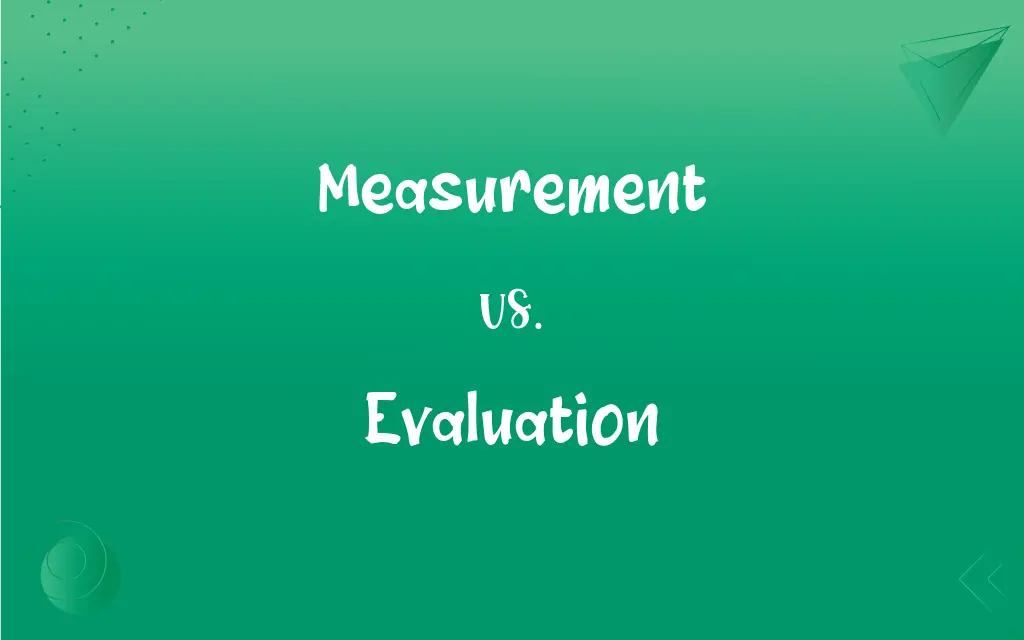Measurement vs. Evaluation: What's the Difference?
Edited by Aimie Carlson || By Janet White || Published on November 13, 2023
Measurement vs. Evaluation: "Measurement" is quantifying an attribute, while "Evaluation" assesses based on various criteria.

Key Differences
"Measurement" refers to the action of obtaining the magnitude, size, or amount of something in quantifiable terms, typically by using instruments or devices designed for this purpose. For instance, using a ruler to determine the length of a piece of paper involves measurement. On the other hand, "Evaluation" involves making a judgment about something based on specific criteria or standards. For example, a teacher might evaluate a student's essay based on criteria like grammar, coherence, and use of evidence, making a qualitative judgment.
"Measurement" is often objective, relying on standard units and methods to obtain a result. For example, a thermometer provides a direct measurement of temperature, offering a specific value that isn’t open to interpretation. Conversely, "Evaluation" is more subjective, involving the assessment of various components, which can include both qualitative and quantitative aspects. For instance, evaluating a restaurant might involve considering the food quality, service, atmosphere, and price.
"Measurement" is an act that can be replicated and verified by others. When you measure something, the same process can be followed by someone else, and — conditions being consistent — it will provide the same result. In contrast, "Evaluation" often includes a degree of subjectivity and personal judgment, meaning that two individuals might evaluate the same object or scenario differently based on their perspectives, experiences, or criteria for assessment.
"Measurement" doesn't inherently involve any judgment; it’s about obtaining factual data. For example, measuring a room to find out its area provides a factual piece of information. "Evaluation," however, is inherently about judgment; it involves interpreting data, often alongside other information, to reach a conclusion or make a decision. Evaluating a house, for instance, involves considering factors like location, condition, and price, and weighing them according to the evaluator’s priorities.
"Measurement" and "Evaluation" can be interconnected. Accurate measurements can form an important basis for a fair and objective evaluation. For example, in a scientific experiment, precise measurements — such as the amount of a substance used or the time a reaction takes — are crucial for the accurate evaluation of outcomes and hypotheses. Yet, the evaluation will consider these measurements in the context of theoretical expectations, previous research, and the implications of the results.
ADVERTISEMENT
Comparison Chart
Nature
Quantitative
Qualitative, sometimes quantitative
Objective
To quantify
To assess or judge
Basis
Standard units
Criteria or standards
Subjectivity
Generally objective
Often subjective
Process
Systematic and replicable
Involves interpretation
ADVERTISEMENT
Measurement and Evaluation Definitions
Measurement
The act of determining size, length, or capacity.
The measurement of the floor was crucial for the new carpet.
Evaluation
The making of a judgment about something.
His evaluation of the project was fair.
Measurement
The dimensions, quantity, or capacity of something.
The scientist recorded the measurement in her notebook.
Evaluation
A written assessment of performance.
He received his evaluation from his supervisor.
Measurement
The action of measuring something.
Regular measurement of blood pressure is important for health.
Evaluation
The assessment of performance.
The evaluation of the staff was conducted annually.
Measurement
The size, length, or amount of something, ascertained by measuring.
The tailor took his measurement for the suit.
Evaluation
The act of considering or examining something in order to judge its value, quality, importance, extent, or condition.
The evaluation of the program determined its success.
Measurement
The act of measuring or the process of being measured.
Evaluation
To ascertain or fix the value or amount of
Evaluate the damage from the flood.
Measurement
A system of measuring
Measurement in miles.
Evaluation
To determine the importance, effectiveness, or worth of; assess
Evaluate teacher performance.
Measurement
The dimension, quantity, or capacity determined by measuring
The measurements of a room.
Evaluation
(Mathematics) To calculate the numerical value of; express numerically.
Measurement
The act of measuring.
Evaluation
An assessment, such as an annual personnel performance review used as the basis for a salary increase or bonus, or a summary of a particular situation.
The result of the semestral evaluation will go towards your final score.
Measurement
Value (quantity, magnitude, extent or amount) determined by an act of measuring.
Evaluation
(mathematics) A completion of a mathematical operation; a valuation.
Measurement
The act or result of measuring; mensuration; as, measurement is required.
Evaluation
Determination of the value of a variable or expression.
Measurement
The extent, size, capacity, amount. or quantity ascertained by measuring; as, its measurement is five acres.
Evaluation
Valuation; appraisement.
Measurement
The act or process of measuring;
The measurements were carefully done
His mental measurings proved remarkably accurate
Evaluation
Act of ascertaining or fixing the value or worth of
Measurement
A quantifiable attribute of something.
Her measurement of the parcel was precise.
Evaluation
An appraisal of the value of something;
He set a high valuation on friendship
Evaluation
The process of judging or calculating the quality, importance, amount, or value of something.
Her evaluation of the painting determined its authenticity.
FAQs
What does "evaluation" entail?
It involves assessing quality or performance against criteria.
Can a "measurement" be subjective?
Typically no, it's objective and based on standard units.
Can two people have different "evaluations"?
Yes, evaluations can vary based on personal judgment.
Is a "measurement" always numerical?
Generally, yes, it quantifies aspects in numerical terms.
Can "measurement" be inaccurate?
Yes, if not done carefully or with faulty tools.
Does "evaluation" always involve opinion?
Often, yes, it involves personal or professional judgment.
Is "evaluation" a one-time process?
No, it can be ongoing or repeated as needed.
Who performs an "evaluation"?
Experts, supervisors, or anyone qualified to assess.
What's a standard unit in "measurement"?
Accepted units like meters, kilograms, etc.
What is a "measurement"?
It's quantifying an attribute using standard units.
Can "evaluation" be biased?
Yes, personal perceptions can influence it.
Why is "measurement" important?
It provides objective, verifiable data.
Is "measurement" a skill?
Yes, it often requires training and precision.
What factors affect an "evaluation"?
Criteria, perspectives, and the information available.
What's the goal of an "evaluation"?
To judge value, quality, importance, or condition.
Can you measure without tools?
It's possible, but less accurate and standardized.
Does "measurement" require special tools?
Often, yes, appropriate tools for accuracy.
Is "measurement" applicable in daily life?
Absolutely, in cooking, building, and more.
Are "evaluations" necessary?
Yes, for informed decisions and improvements.
Why might "evaluations" differ?
Different criteria, standards, or perspectives.
About Author
Written by
Janet WhiteJanet White has been an esteemed writer and blogger for Difference Wiki. Holding a Master's degree in Science and Medical Journalism from the prestigious Boston University, she has consistently demonstrated her expertise and passion for her field. When she's not immersed in her work, Janet relishes her time exercising, delving into a good book, and cherishing moments with friends and family.
Edited by
Aimie CarlsonAimie Carlson, holding a master's degree in English literature, is a fervent English language enthusiast. She lends her writing talents to Difference Wiki, a prominent website that specializes in comparisons, offering readers insightful analyses that both captivate and inform.






































































